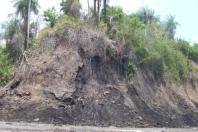For T&T oil sands, talks before threats
For T&T oil sands, talks before threats
As an international caucus of environmentalists zeroed in on Trinidad and Tobago's oil sands prospects, activist Wayne Kublalsingh, leader in an aggressive campaign to reroute part of the Point Fortin highway, unmistakably threw down another gauntlet. He actually warned on Sunday that "if the Government were to proceed (with oil sands) they will fall."
Energy Minister Kevin Ramnarine, driven to turn around the relentless slide in crude oil production, must now know he has a fight on his hands. Over the six years to 2011, T&T crude oil production fell by more than half.
Such a pattern of decline in the vital industry has defined a cause in which Mr Ramnarine has become a crusader. With the price of oil internationally high, the Energy Ministry has turned its attention both to heavy oil on land in south Trinidad and in the Gulf of Paria, and to the tar sands located in some 13 square kilometres also in the deep south.
Energy authorities' eyes brighten at the estimate of two billion barrels waiting to be extracted, by unconventional practices, from the long-disregarded oil sands. This estimate is advanced by geologist Herbert Sukhu, who is also a mining engineer familiar with the techniques developed in northwestern Canada for lifting crude from oil sands.
Meeting Canadian Prime Minister Stephen Harper at the Americas Summit in Cartagena, Prime Minister Kamla Persad-Bissessar and Mr Ramnarine described T&T as a tar sands frontier in the making. It pleasantly surprised the Canadian leader to learn that another country is aiming to follow a trail being blazed in his country's "Northern Gateway". That project, intended to make Canada an "energy superpower", entails daily pumping of some 525,000 barrels of oil sands crude for export to Asian markets from Pacific Ocean tanker ports.
Beset by challenges on environmental grounds, the Ottawa government last month sharply speeded up the regulatory process to ensure earliest realisation of the oil sands economic benefits, while claiming to "maintain the highest standards of environmental protection". Local tar sands prospects have now drawn the attention of a Canadian activist visiting to propagate the message that oil sands development has caused "so much pain to people in Canada."
The Canadian experience teaches that a government, with energy industry support, motivated by potential economic gains, will press ahead with oil sands, ultimately disregarding the thunder of environmental protest over land and water pollution and negative impacts on the world climate. The need to derive maximum benefit from energy resources is likely to spur full-speed-ahead policies in Port of Spain as well.
Time yet remains for a State-organised national discussion to clarify both the feared environmental costs and the attractive economic benefits. This should take place without need of mortal threats made or carried out on any side of the debate.
http://www.trinidadexpress.com/commentaries/For_T_T_oil_sands___talks_be...


